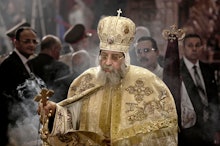Who are the Coptic Christians? What to know about the religious minority attacked in Egypt

A bus carrying Coptic Christians was attacked by gunmen in Egypt's Minya province Friday, leaving at least 28 dead and dozens more wounded in the latest assault on the country's Christian minority.
On April 9, two Coptic churches were targeted by Islamic State suicide bombers during Palm Sunday services, killing 44 and leading President Abdel-Fatah el-Sissi to declare a state of emergency.
Those attacks followed a December bombing at Cairo's main Coptic cathedral, killing 25.
"They have never been targeted in the way that they are now," Steven A. Cook, a senior fellow at the Council on Foreign Relations, told NBC News in April. "Egypt is extremely dangerous for Copts in ways it hasn't been dangerous before."
Who are the Coptic Christians?
Coptic Christians, who make up about 10% of Egypt's population, are the largest Christian community in the Middle East.
The Coptic Orthodox Church is almost 2,000 years old, and is based primarily on the teachings of the Saint Mark. The Copts share similar beliefs as the Catholic Church, such as adherence to the Ten Commandments and the practice of baptism, but also diverge in a number of ways and have their own pope — Pope Tawadros II.
The Copts have a long history of persecution, especially during the Byzantine empire and following the Arab conquest of Egypt in the seventh century.
Why are the Copts under attack?
Coptic Christians have faced increased persecution since President Hosni Mubarak was ousted in 2011, according to CNN. Many Copts had "reluctantly backed" the dictator who, while excluding them from government, protected them from Islamic extremists, according to PBS.
Copts continue to have little representation in the Egyptian government, and Islam is the official state religion. Though Sissi is often regarded as more outwardly supportive of the Copts than his predecessors, according to the Brookings Institute, his government has also been criticized for failing to adequately protect its minorities from violence. Further, Brookings notes, Sissi's authoritarian crackdown on press freedom in the country threatens to cut Copts off from the international community.
After attacking the main Coptic church in December 2016, the Islamic State released a video telling Christians they are "our first target and favorite prey," and urged followers to target them, CNN reported.
Christians have had to evacuate some communities amid the attacks.
After the Palm Sunday attacks — the "deadliest day of violence" against the Copts in decades — the Atlantic reported that the anti-Copt violence seemed part of "a cold and calculated strategy" by the Islamic State to use sectarian violence in an attempt to "unravel" Egypt.
"It is unlikely that this strategy will succeed the way ISIS envisions in Egypt, but the attempt to implement it will leave a trail of destruction that will primarily devastate Egypt's Christian minority," Mokhtar Awad wrote.
Pope Francis visited Egypt in late April following the church bombings, where he condemned the violence as "incompatible" with "true faith."
No groups have claimed responsibility for Friday's attack, in which 10 gunmen reportedly opened fire on a bus that was en route to St. Samuel Monastery.